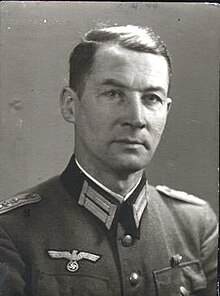Wilm Hosenfeld
| Wilm Hosenfeld | |
|---|---|

Captain Wilm Hosenfeld
|
|
| Born |
2 May 1895 Mackenzell, Hesse-Nassau, Prussia, German Empire |
| Died | 13 August 1952 (aged 57) Stalingrad, Russian SFSR, Soviet Union |
| Allegiance |
|
| Service/branch | Army |
| Years of service | 1914–1917 1939–1945 |
| Rank | Hauptmann |
| Unit | Wach-Bataillon (guard battalion) 660 |
| Battles/wars |
World War I World War II |
| Awards |
Iron Cross Second Class Wound Badge in Black War Merit Cross 2nd Class with Swords Cross of Honour SA sport Badge Order of Polonia Restituta |
Wilhelm Adalbert Hosenfeld (German pronunciation: [ˈvɪlm ˈhoːzənfɛlt]; 2 May 1895 – 13 August 1952), originally a school teacher, was a German Army officer who by the end of the Second World War had risen to the rank of Hauptmann (Captain). He helped to hide or rescue several Polish people, including Jews, in Nazi-occupied Poland, and helped Polish-Jewish pianist and composer Władysław Szpilman to survive, hidden, in the ruins of Warsaw during the last months of 1944, an act which was portrayed in the 2002 film The Pianist. He was taken prisoner by the Red Army and died in Soviet captivity seven years later.
In June 2009, Hosenfeld was posthumously recognized in Yad Vashem (Israel's official memorial to the victims of The Holocaust) as one of the Righteous Among the Nations.
He was born into the family of a pious Roman Catholic schoolmaster living near Fulda. His family life had a Catholic character, and Christian social justice work was emphasized during his education. He was influenced by the Catholic Action and Church-inspired social work, but also by Prussian obedience, by German patriotism, and, during his marriage, by the increasing pacifism of his wife, Annemarie. He was also influenced by the Wandervogel movement and its adherents. From 1914 he saw active service in the First World War, and after being severely wounded in 1917 received the Iron Cross Second Class.
...
Wikipedia
